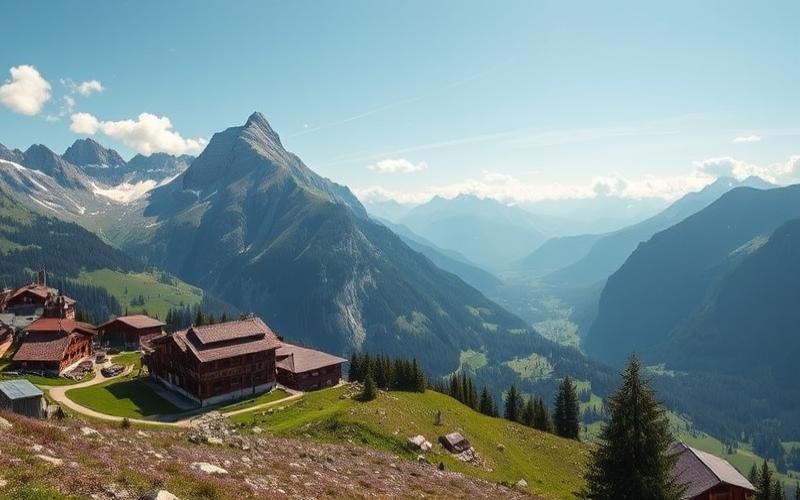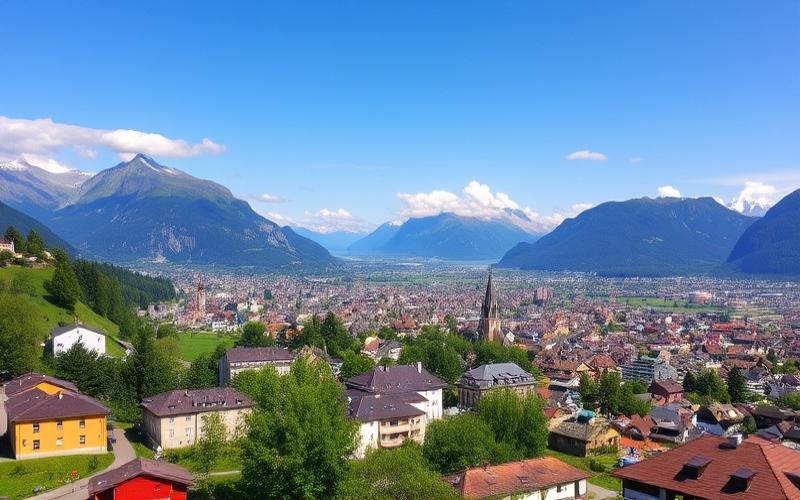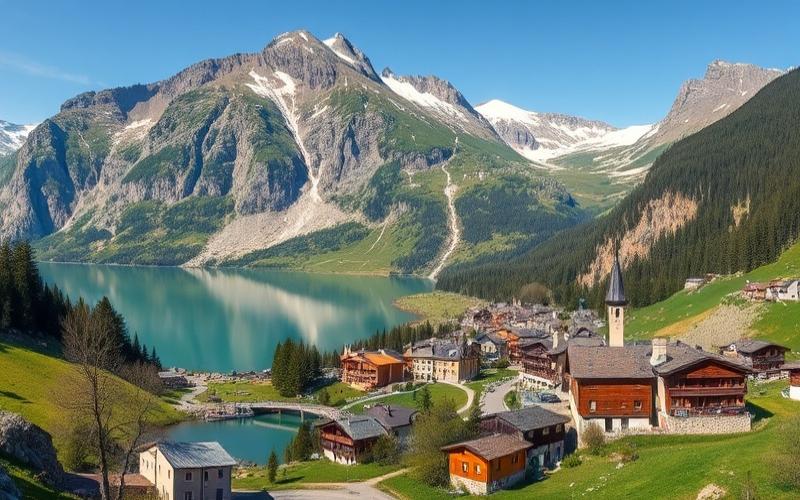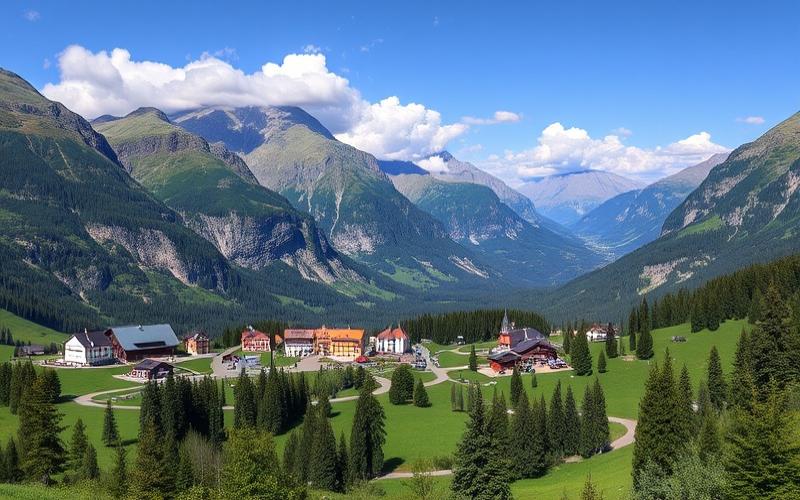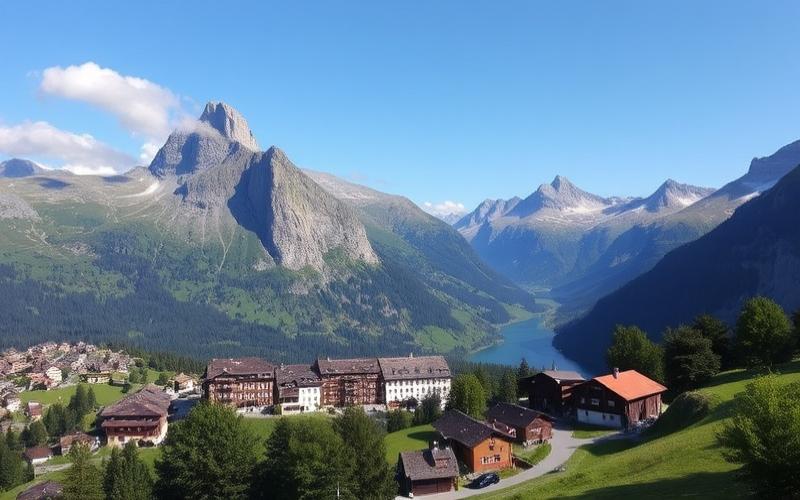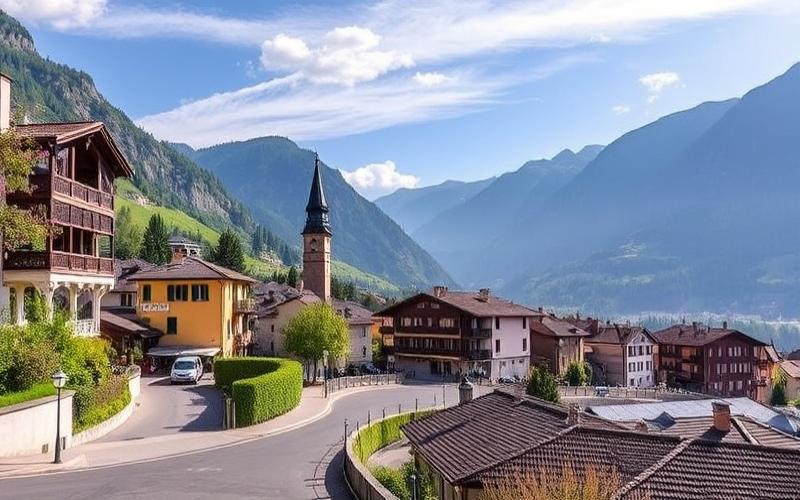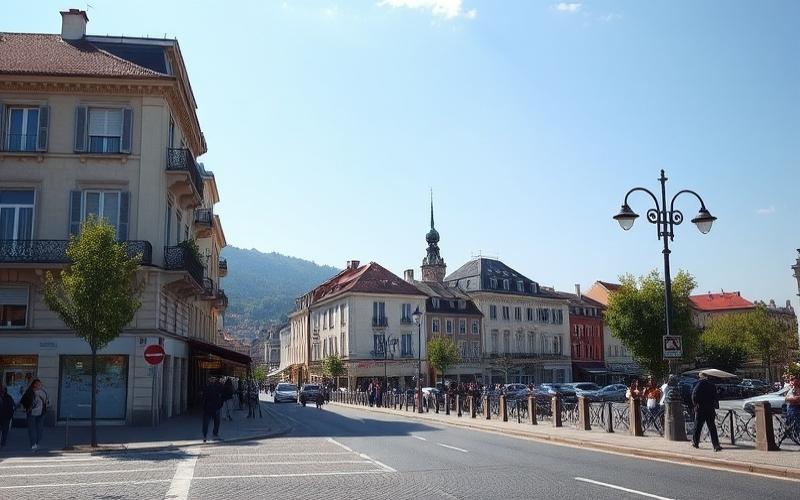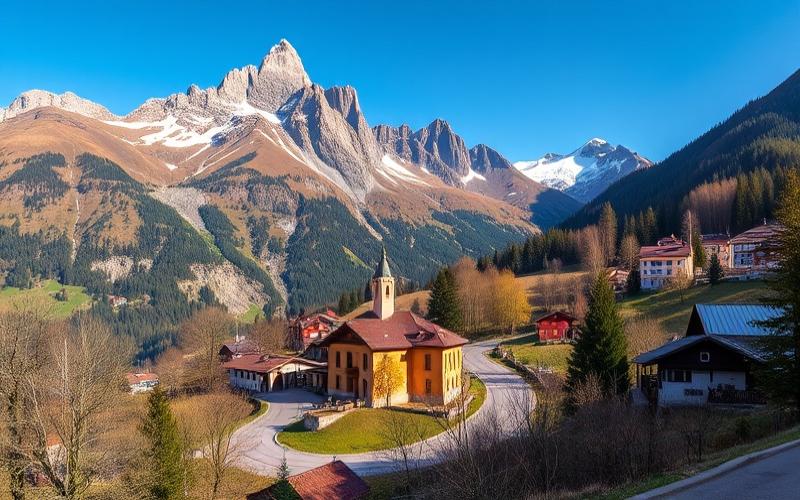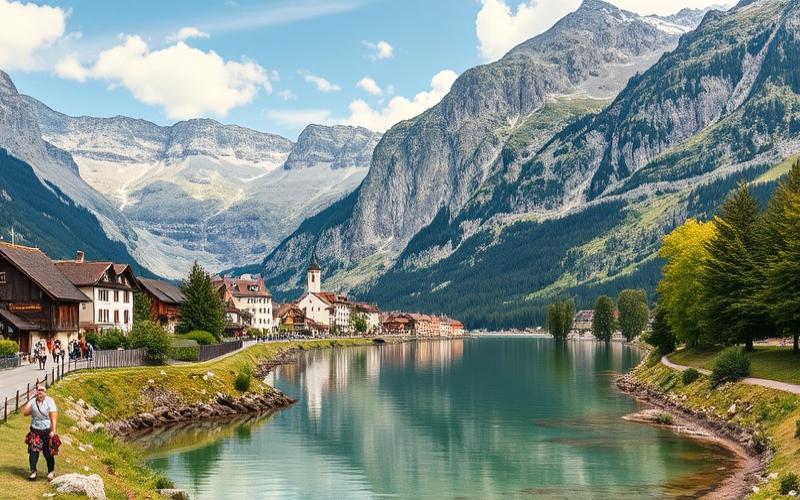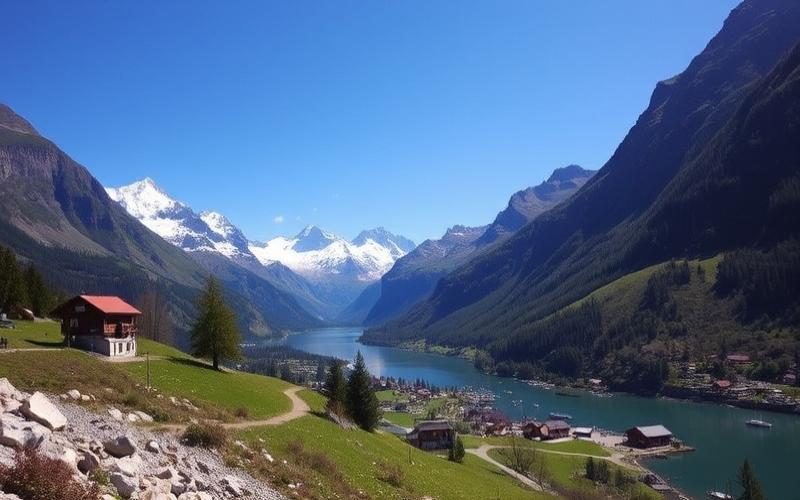
 Published on and written by Cyril Jarnias
Published on and written by Cyril Jarnias
Dark Stores: A New Real Estate Phenomenon in Switzerland
While Swiss real estate is often associated with picturesque landscapes and traditional architecture, a new urban phenomenon is drawing attention: dark stores, these urban warehouses transformed into logistics centers for online commerce.
Rapidly expanding in major Swiss cities, they raise questions about the evolution of commercial spaces and their impact on citizens’ daily lives.
This phenomenon not only alters the economic dynamics and use of urban spaces but also sparks debates about regulation and the environmental impact of these new players in the real estate sector.
Rise of Dark Stores in Switzerland
A dark store is a warehouse or distribution point dedicated exclusively to preparing and delivering online orders, primarily in the quick commerce sector. Unlike traditional stores accessible to the public, dark stores are closed to customers; they often resemble conventional supermarkets but serve solely as logistics centers where products are stocked on shelves to facilitate rapid order preparation. Their main mission is to ensure very fast delivery (sometimes in under 15 minutes) or in-store pickup via a click-and-collect service.
| Criterion | Traditional Store | Dark Store |
|---|---|---|
| Customer Access | Open to the public | Closed to the public |
| Primary Function | Physical sales | Web order preparation/delivery |
| Typical Location | Shopping districts | Near dense urban areas |
Since 2020, the number of dark stores has seen strong growth in Switzerland, especially in major cities such as Zurich, Geneva, and Lausanne. This geographic expansion responds to the need to be close to consumers to guarantee short delivery times. Urban centers therefore concentrate the majority of these structures.
Several economic and social factors have favored their development:
- Explosion of online commerce and increased expectations for fast deliveries.
- Changes in consumption habits (preference for digital).
- Increased competitive pressure pushing traditional distributors to optimize their logistics.
- Massive investments by private funds seeking to capture this new dynamic market.
The COVID-19 pandemic played a catalytic role: with the temporary or partial closure of physical stores and the sudden increase in remote work, demand for rapid delivery soared. Many players repurposed their unused commercial spaces into dark stores to clear their inventory while maintaining their business activity.
In Switzerland, several companies stand out in this niche:
- Digital subsidiaries of major Swiss distributors.
- Specialized pure players from European or international quick commerce.
The main advantages offered by dark stores are:
- For consumers: unmatched speed, expanded product availability via mobile apps, flexible hours.
- For operators: logistics optimization through automation and advanced data analysis.
- For the real estate market: temporary valuation or new use of vacant commercial assets.
Identified disadvantages include:
- Loss of the social connection associated with traditional physical stores.
- Potential nuisances (increased traffic related to deliveries) in some densely populated residential neighborhoods.
- Possible impact on traditional local employment related to physical commerce.
For the Swiss real estate market—particularly urban—this shift implies an accelerated conversion of sometimes vacant commercial spaces toward these new hybrid forms between warehouse and pickup point. It also raises questions about the future evolution of the traditional commercial fabric facing the risk of gradual “desertification.”
In the medium term, several challenges await this emerging sector:
- Potential regulations concerning commercial/logistics zoning (to limit nuisances).
- Tightened control around compliance with local laws on urban land use.
- Constant search for profitability while many players still operate with external financial support without quickly reaching their economic critical threshold.
Good to Know:
Dark stores, warehouses dedicated exclusively to preparing online orders, differ from traditional stores by their absence of in-person customers. In Switzerland, their numbers have increased, mainly in urban areas like Zurich and Geneva. The rise of these structures was catalyzed by the COVID-19 pandemic, growing demand for fast deliveries, and the need for less expensive spaces than traditional commercial premises. Companies such as Migros and Coop are key players. While dark stores offer advantages, like speed for consumers, they pose constraints for local communities, such as increased traffic and redefinition of urban space usage. They also influence the real estate market by converting commercial zones into logistical spaces, raising regulatory and noise level concerns, and their future expansion might be limited by strict land-use regulations.
Impact of Dark Stores on Urban Real Estate
The emergence of dark stores in Switzerland is profoundly transforming the urban real estate market. Dark stores, logistics spaces closed to the public designed for the rapid preparation and delivery of online orders, are driving a massive conversion of former vacant commercial or industrial premises but also pose several regulatory and social challenges.
Key Observed Trends:
- Accelerated conversion of traditional commercial spaces (shops, small supermarkets) into logistics spaces optimized for e-commerce.
- Selective rent increases in certain real estate segments near downtown or well-served by roadways; e-commerce players are willing to pay more to optimize their distribution network.
- Progressive valuation of previously underutilized peripheral and industrial spaces.
| Urban Area | Effect on Prices | Expected Evolution |
| City Center | Targeted increase | High rents for adapted warehouses; increased vacancy of shops |
| Periphery/Industrial | Moderate valuation | Progressive optimization based on urban density |
Consequences on Real Estate Supply:
- Reduced availability of classic commercial premises in some strategic neighborhoods.
- Increased pressure on existing real estate inventory, potentially leading to a general price rise in sought-after areas.
- Heightened risk of commercial desertification in certain shopping streets if too many spaces are converted.
Reactions from Developers and Regulators:
Real estate developers see this shift as an opportunity to quickly revalue their unoccupied assets but remain attentive to the risk of accelerated obsolescence of traditional commerce.
Local authorities are questioning the regulatory classification to adopt: warehouse or commerce? This ambiguity sometimes leads to a temporary freeze on permits or the establishment of specific quotas per neighborhood.
Several European cities have already implemented commercial preemption rights allowing municipalities to oversee these transformations to preserve a diversified commercial fabric.
Effects on Traditional Commerce:
“Excessive proliferation can contribute to a decrease in the commercial attractiveness of the concerned neighborhood… What about the social connection previously maintained by these street activities?”
Dark stores lead to:
- A possible decrease in foot traffic around remaining physical stores
- A potential weakening of the local economic fabric (fragilized independent businesses)
In this context, some players advocate for the priority use of unoccupied spaces (unused underground parking) rather than the systematic transformation of classic ground-floor commercial spaces to limit the negative impact on vibrant urban life.
Recent Evolution:
Although not precisely quantified in Switzerland to date, the European trend shows that in 2024–2025 several large metropolitan areas saw up to 10–15%* of their commercial rental stock partially shift toward the “dark store” model in their central or suburban zones (*sector source). This dynamic is expected to intensify with the continued rise of urban quick commerce.
Good to Know:
The emergence of dark stores in Switzerland leads to a notable restructuring of the urban real estate market, as more and more traditional stores are converted into dark stores to meet growing demand for fast deliveries. This phenomenon tends to reduce the availability of commercial premises in city centers, sometimes pushing prices upward. Real estate developers and regulators face the challenge of balancing this transformation with the preservation of traditional commerce, whose demand is decreasing in favor of modern logistics models. Recent studies show that in some major Swiss cities, up to 20% of new commercial leases involve dark stores, thus increasing pressure on the classic real estate market. This trend imposes a reconfiguration of urban infrastructures to better integrate these specialized spaces while minimizing negative repercussions on the local economic fabric.
Logistics Real Estate and Last Mile Challenges
The “last mile” refers to the final phase of the logistics chain, corresponding to the delivery of a package from a distribution center or hub to the final recipient. This stage, which does not literally represent a precise distance but rather the ultimate segment of the package’s journey, is crucial because it concentrates consumer expectations regarding speed and flexibility.
Why is the Last Mile Taking on Increasing Importance?
- Explosion of e-commerce and home deliveries.
- High expectations for short delays and increased traceability.
- Financial weight: this stage can represent up to 53% of total logistics costs.
Swiss Specificities and Real Estate Adaptations
In Switzerland, high urban density, geographical specificities (Alpine terrain) and territorial fragmentation require:
- Compact urban logistics platforms to limit distances traveled in the city.
- Increased use of multipurpose spaces (warehouses shared among several players).
- Careful architectural integration in residential areas to minimize visual and noise impact.
| Swiss Specificities | Real Estate Adaptations |
|---|---|
| Urban density | Urban mini-hubs |
| Mountainous terrain | Modular warehouses |
| Strict regulations | Multi-use sites |
Urban/Suburban Issues & Emerging Solutions
Major challenges in these zones include:
- Road congestion making deliveries slow or unpredictable
- Environmental restrictions on thermal vehicles
- Limited access to delivery points (pedestrian-only old towns, buildings without elevators)
Observed innovative solutions:
- Electric vehicles dedicated to the last mile
- Automated relay points (“lockers”)
- Shared delivery routes via digital platforms
Key Role of Dark Stores as Logistics Hubs
Dark stores are spaces dedicated exclusively to storing and rapidly preparing online orders. Without physical customer service, they optimize picking through their strategic location near residential areas. They thus serve as mini-hubs capable of ensuring:
- Maximum responsiveness for rapid delivery
Dark stores are establishing themselves as an essential link to streamline the supply chain to the final consumer while limiting the overall carbon footprint.
Challenges & Opportunities for Swiss Real Estate
Challenges:
- Land scarcity in city centers suitable for logistics development
- Social acceptability: fear of urban degradation (noise/visual nuisances)
- Necessary regulatory adaptation facing new hybrid uses
Opportunities:
- Increased valuation of underutilized assets (former underground parking converted into micro-hubs)
- Sustained growth driven by food e-commerce/express B2C/B2B delivery
- Accelerated deployment of technological solutions (automation of urban warehouses)
The rise of the last mile is profoundly transforming the Swiss real estate landscape: it imposes spatial agility, technological innovation, and close collaboration between private/public operators to sustainably support this new economic reality.
Good to Know:
The concept of last mile in the logistics sector refers to the final phase of delivering a product to the consumer and is taking on increasing importance in Switzerland due to heightened demand for fast and efficient delivery. To meet the requirements of this segment, logistics real estate must adapt by integrating facilities closer to urban areas, often in the form of “dark stores,” which serve as hubs to optimize distribution. Urban deliveries pose unique challenges, particularly regarding traffic and access restrictions, prompting the development of innovative solutions such as the use of electric vehicles or the establishment of relay points. These transformations offer the Swiss real estate market new opportunities through the strategic placement of these micro-warehouses, although this comes with challenges related to space repurposing and local regulations.
E-commerce Investment and New Trends
Dark stores are profoundly transforming the Swiss real estate market, particularly in urban areas where demand for suitable commercial premises and warehouses is exploding. This evolution is explained by the necessity to have logistics spaces near consumers to guarantee ultra-fast deliveries, a key criterion of modern e-commerce.
Impact on the Swiss Real Estate Market:
- Increased demand for:
- Commercial premises convertible into urban logistics centers
- Medium-sized warehouses well-served and located near city centers
- Heightened tension on urban real estate supply, increasing competition with other uses (offices, traditional commerce)
- Risk of market saturation: rapid multiplication of dark stores potentially leading to vacancy or forced reconversion if the economic model evolves
| Type of Space | Observed Trend | Real Estate Consequence |
|---|---|---|
| Central premises | Strong increase in demand | Rent increases |
| Urban warehouses | Conversion of former stores | Increased scarcity |
| Peripheral zones | Optimized but less sought-after | Lower pressure |
Opportunities and Challenges for Swiss Real Estate Investors:
Opportunities:
- Accelerated valuation of properties compatible with urban logistics activity
- New high-yield rental segments thanks to food and express e-commerce
Challenges:
- Continuous adaptation to technical needs (accessibility, refrigerated storage)
- Regulatory uncertainty linked to social acceptability (noise nuisances, increased traffic)
- Reputational risk in case of local rejection or restrictive regulation
New Technologies & Strategies Adopted by Dark Stores:
Non-exhaustive list:
- Advanced picking automation through internal robotics
- IT systems optimizing real-time inventory based on local demand evolution
- Innovative last-mile solutions (light electric fleets, connected cargo bikes)
Comparative Table:
| Technology/Strategy | Target Objective |
|---|---|
| Automated picking | Reduce delays & costs |
| Predictive AI | Optimize stock management |
| Eco-friendly deliveries | Limit environmental impact |
Long-term Implications on Urban Planning and Regulation:
Synthetic list:
- Necessity to adapt local urban plans to clearly define zones authorized for rapid logistics activities
- Possible limitations or quotas imposed in some residential neighborhoods sensitive to nuisances generated by these new flows
- Probable emergence of specific regulations governing hours, exterior signage, and accessibility to preserve urban quality of life
Investments in this segment require a fine reading of the Swiss urban fabric: anticipating both regulatory and technological evolution becomes essential to secure investments sustainably facing the rapid transformations driven by e-commerce.
Good to Know:
The rise of dark stores in Switzerland is transforming the real estate market by increasing demand for commercial premises and urban warehouses adapted to the specific needs of e-commerce. This trend offers real estate investors attractive opportunities but also presents challenges, including the need to adapt logistics infrastructure to optimize deliveries. Dark stores adopt advanced technologies such as automation and real-time inventory management systems to improve operational efficiency and quickly meet consumer demands. Long-term, this could influence urban planning and require new regulations to balance the use of commercial surfaces in Swiss urban centers.
Disclaimer: The information provided on this website is for informational purposes only and does not constitute financial, legal, or professional advice. We encourage you to consult qualified experts before making any investment, real estate, or expatriation decisions. Although we strive to maintain up-to-date and accurate information, we do not guarantee the completeness, accuracy, or timeliness of the proposed content. As investment and expatriation involve risks, we disclaim any liability for potential losses or damages arising from the use of this site. Your use of this site confirms your acceptance of these terms and your understanding of the associated risks.



